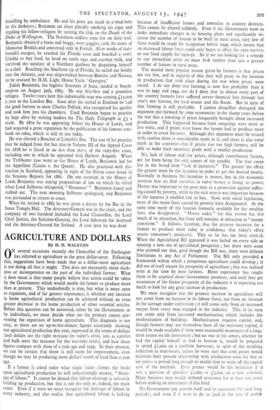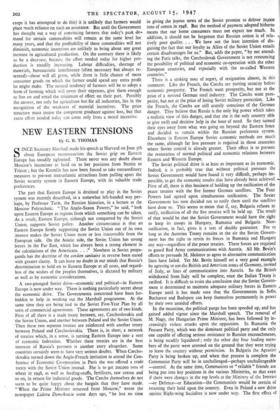AGRICULTURE AND DOLLARS
By H. D. WALSTON
ON several occasions recently the Chancellor of the Exchequer has referred to agriculture as the great dollar-saver. Following this, suggestions have been made that as a dollar-saver agriculture is not doing all that it might. This does not necessarily mean slack- ness or incompetence on the part of the individual farmer. What it does mean is that many people believe that action could be taken by the Government which would enable the farmer to produce more than at present. This undoubtedly is true, but what is more open to argument, and of far greater importance, is whether any increase in home agricultural production can be achieved without an even greater decrease in the home production of other essential articles. Before this question can be answered, either by the Government or by individuals, we must decide what are the primary causes pre- venting the expansion of home agriculture. This diagnosis is not easy, as there are no up-to-the-minute figures accurately showing our agricultural production this year, expressed in the terms of dollars (and dollars are the right measure for today's crisis, just as calories and bulk were the measure for the war-time crisis), and how these figures compare with those of a year ago and 1939. In their absence, we can be certain that there is still room for improvement, even though we may be producing more dollars' worth of food than a year ago.
If a farmer is asked today what single factor clamps the brake upon agricultural production he will unhesitatingly answer, " Short- age of labour." It cannot be denied that labour-shortage is seriously holding up production, but this is not the only or, indeed, the main cause. Even if it were we must recognise the shortage of labour in every industry, and also realise that agricultural labour is lacking
because of insufficient houses and amenities in country districts. This cannot be altered suddenly. Even if the Government were to make immediate changes in its housing plans and significantly in- crease the number of houses to be built in rural areas, very few of these would be ready for occupation before 1949, which means that an increased labour force could only begin to affect the 195o harvest, or our food supply for 1950-51. So if we are looking for a remedy to our immediate crisis we must look further than just a greater number of houses in rural areas.
The second most popular reason given by farmers is that prices are too low, and in support of this they will point to the increase in production that took place during the war when prices were raised. I do not deny that farming is now less profitable than it was in 1943 and 1944, nor do I deny that in almost every part of the country farmers have suffered severe financial loss through last year's wet harvest, the hard winter and the floods. But in spite of that farming is still profitable. I cannot altogefher disregard the argument put forward by some economists in the slump years before the war that a lowering of prices frequently brought about increased production. This happened because farm outgoings were more or less static, and if prices were lower the farmer had to produce more in order to cover his costs. Although this argument must be treated with caution there is considerable truth in it, and there is also some truth in the converse—that if prices rise too high farmers will be able to make their necessary profit with a smaller production.
No, lack of labour and low prices, although contributory factors, are far from being the only causes of the trouble. The true cause lies in the broad term " lack of incentive." The greater the effort the greater must be the incentive in order to get the desired results. Normally in business the incentive is money, but in the economic position that we find ourselves in today money is losing its power. Money was important to the poor man as a protection against suffer- ing caused by poverty, while to the rich man it was important because of the luxuries it enabled him to buy. Now, with social legislation, most of the major fears caused by poverty have disappeared. At the same time many of the luxuries formerly available for the wealthy have also disappeared. " Money today " for that reason has lost much of its attraction, but there still remains at attraction in " money tomorrow." It follows, therefore, that the greatest incentive for a fanner to produce more today is confidence that today's effort means tomorrow's prosperity. This so far has not been creatzd. When the Agricultural Bill appeared it was hailed on every side as opening a new era of agricultural prosperity ; but there were some who pointed out that, good though the Bill was, there were definite limitations to any Act of Parliament. The Bill only provided a framework within which a prosperous agriculture could develop ; it did not of itself ensure the prosperity of agriculture ; this was realised even at the time by most farmers. Bitter experience has taught them to be sceptical about Government promises, and until they get assurances of the future prosperity of the industry it is expecting too much to look for any great increase in production.
We must recognise that the greatest increase in agriculture will not come from an increase in its labour force, nor from an increase in the acreage under cultivation ; it will come only from an increased output from every man engaged in the industry. This in its turn can come only from increased mechanisation, which includes the modernisation of buildings. Mechanisation requires capital, and, though farmers may not themselves have all the necessary capital, it would be made available if there were reasonable assurances of a long- term return on the investment ; but no one in his senses, whether he had the capital himself or had to borrow it, would be prepared to spend £I,000 on a combine harvester, in spite of the resulting reduction in man-hours, unless he were sure that corn prices would maintain their present relationship with production costs for five or six years—a period long enough to enable him to write off the capital cost of the machine. Even greater would be his hesitation if it was a question of spending £2,000 or L3,000 on a new cowshed. Many business men would demand assurance for at least ten years before making an investment of this kind.
No Government can commit itself and its successors for such long periods ; and even if it were to do so (and in the case of arable, crops it has attempted to do this) it is unlikely that farmers would place much reliance on such an assurance. But until the Government has thought out a way of convincing farmers that today's peak de- mand for certain commodities will remain at the same level for many years, and that the profitability of these commodities will not diminish, economic incentives are unlikely to bring about any great increase in agricultural production. On the contrary there is likely to be a decrease, because the effort needed today for higher pro- duction is steadily increasing. Labour difficulties, shortage of materials, bureaucratic interference (often necessary but always re- sented)—those will all grow, while there is little chance of more consumer goods on which the farmer could spend any extra profit he might make. The natural tendency of farmers will be to adopt a form of farming which will cover their expenses, give them enough to live on and entail the minimum of effort on their part. Possibly the answer, not only for agriculture but for all industries, lies in the recognition of the weakness of material incentives. The price structure must insure the competent producer against loss, but that extra effort needed today can come only front a moral incentive.



































 Previous page
Previous page